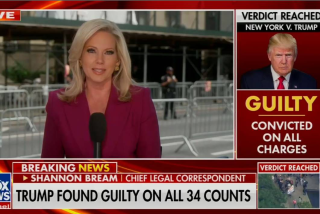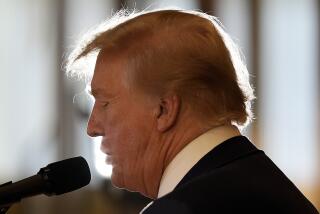Martha Stewart Found Guilty; Prison Likely
- Share via
NEW YORK — In a sweeping victory for the government, a federal jury Friday found Martha Stewart guilty of conspiracy, obstruction of justice and two counts of lying to investigators, a verdict that means the media entrepreneur almost certainly will serve prison time.
Stewart, 62, who built a business empire on her sense of style in food, decorating and entertaining, is the first major figure convicted by a jury in the wave of corporate scandals involving such now-notorious names as Enron Corp., WorldCom Inc., Tyco International Ltd. and Adelphia Communications Corp.
“Maybe it’s a victory for the little guys who lose money in the market because of these kinds of transactions,” said juror Chappell Hartridge of the Bronx.
On its third day of deliberating, the jury of eight women and four men found that Stewart and her ex-stockbroker, Peter E. Bacanovic, hatched a plan to cover up a stock trade that Stewart made after getting an insider tip, then lied to investigators about it. Stewart was not charged with insider trading itself.
Bacanovic, 41, was convicted of conspiracy, perjury, obstruction and lying to investigators. He was acquitted of making a false document.
Both defendants vowed to appeal the verdicts. Sentencing was set for June 17.
Stewart’s crimes each carry penalties of as much as five years in prison and $250,000 in fines. However, legal experts said that under federal sentencing guidelines, Stewart probably faces 10 to 16 months in prison, half of which could possibly be served in a halfway house or other non-prison setting.
The trial centered on Stewart’s Dec. 27, 2001, sale of her 3,928 shares of ImClone Systems Inc., founded by Stewart’s friend Samuel D. Waksal. Waksal, a man about town who once dated Stewart’s daughter, is serving seven years in prison for insider trading, based on his and his family’s attempts to dump their own ImClone holdings that day.
The stock sales by Stewart and the Waksals came one day before the Food and Drug Administration failed to approve ImClone’s key cancer drug, a decision that sent the stock plummeting. Stewart’s well-timed sale saved her around $50,000, authorities say.
At trial, Douglas Faneuil, Bacanovic’s assistant, testified about how he was holding the fort at Merrill Lynch’s Rockefeller Center office on Dec. 27 while his boss was on vacation in Florida. Faneuil said he was flooded by calls that morning from Waksal family members and representatives trying anxiously to sell large blocks of ImClone stock.
Faneuil said he conferred by cellphone with Bacanovic, who insisted that Faneuil contact Stewart -- herself on the way to a vacation in Mexico -- and let her know that the Waksals were selling and the stock was falling.
When Stewart called him back later that day, Faneuil testified, he told her about the Waksals, and she asked for the stock’s price and then ordered him to sell all her shares.
Within days, the SEC had launched an investigation of Waksal that spilled over to Stewart. The jury found that over the next few months, she and Bacanovic concocted a story that they had a prior agreement to sell the stock if it fell to $60 -- as it did that day -- and repeatedly lied to investigators to cover their tracks.
Stewart came across in testimony as petty and irascible, once threatening to pull her investment portfolio away from Merrill Lynch because she didn’t like the telephone “hold music.”
In a “Dear Friends” letter posted on her “MarthaTalks” website shortly after the verdicts, Stewart said: “I am obviously distressed by the jury’s verdict but I continue to take comfort in knowing that I have done nothing wrong and that I have the enduring support of my family and friends.”
“I will appeal the verdict and continue to fight to clear my name. I believe in the fairness of the judicial system and remain confident that I will ultimately prevail,” the statement said.
The five-week trial, which involved high-stakes gambles by both the prosecution and defense, came to an end Friday just after 3 p.m. Eastern time, when U.S. District Judge Miriam Goldman Cedarbaum read aloud the verdicts. There was a collective gasp in the packed courtroom at the world “guilty” on count one, the conspiracy charge against Stewart.
Stewart leaned slightly against her lead defense lawyer, Robert G. Morvillo, as the litany of guilty verdicts continued, but her face remained tight and grim, as it had through much of the trial. Bacanovic, too, displayed little reaction to the verdicts.
Others showed more emotion. When Stewart’s daughter, Alexis, turned to leave the courtroom, her face was drenched in tears.
A juror also had tears in her eyes as the verdict was read.
Stewart’s conviction, coming within days of guilty pleas and indictments of high-ranking former executives of Enron and WorldCom, shows that judgment day finally is reaching the top of the executive ladder and that the government, after a slow start, may be gaining momentum in its campaign against financial corruption.
Interim U.S. Atty. David N. Kelley, flanked by Stewart prosecutors Karen Patton Seymour and Michael S. Schachter outside the federal courthouse in lower Manhattan, said he hoped the case would “send an important message that we will not and, frankly, cannot tolerate dishonesty and corruption.”
Considering the billions of dollars worth of financial damage wrought by the Enron and WorldCom debacles, Kelley was asked whether a two-year federal investigation and a five-week trial against Stewart was warranted, given the relatively small amount of money involved in this case.
Lying to investigators strikes at the integrity of the justice system, he replied. Failure to defend against such attacks “results in a flood of corruption,” Kelley said.
Knowing the risks of going to trial, prosecutors tried to strike a plea bargain with Stewart before her indictment. Kelley declined to discuss any such negotiations, but actor Brian Dennehy, who has known Stewart since the two worked in a Wall Street brokerage 30 years ago, told reporters last week that the government was insisting on “a perp walk” in which Stewart would be paraded in handcuffs in front of cameras. She refused the deal, Dennehy said.
Legal experts have been second-guessing Stewart’s lawyers since well before the trial, many saying that they should have recognized the strength of the government’s case and persuaded her to accept a deal.
Having gone forward to trial, Morvillo and Richard M. Strassberg, Bacanovic’s lead lawyer, both decided to keep their clients off the stand. That may have been a wise move, legal experts say, but the jury found their defense to be otherwise weak, juror Hartridge told reporters after the verdicts.
Hartridge, 47, a communications technician, said the most compelling evidence for him was the testimony of Stewart’s assistant, Ann E. Armstrong, and Mariana Pasternak, Stewart’s longtime friend.
Armstrong, in one of the trial’s most dramatic moments, burst into tears on the witness stand before describing how Stewart sat at Armstrong’s computer and altered a potentially incriminating message from Bacanovic, but then directed the aide to restore the original wording.
Pasternak, one of Stewart’s closest friends and a frequent traveling companion, described a conversation with Stewart on the terrace of a luxury hotel in Baja California, where the two were vacationing a few days after Stewart’s Dec. 27, 2001, ImClone trade.
Stewart, according to Pasternak’s testimony, disclosed that she was aware the Waksals were trying to sell. And in a remark that Hartridge said weighed heavily with the jury, Pasternak quoted Stewart as saying : “Isn’t it nice to have brokers who tell you those things?” Under cross examination, however, Pasternak wavered in that recollection.
Faneuil, the government’s star witness, was the “foundation” of the case, Hartridge said, but jurors knew he had cut a deal with prosecutors and waited for other testimony that backed up his claims.
The jury also seemed to be turned off by the stream of celebrities who showed up to support Stewart, including Dennehy, Bill Cosby and Rosie O’Donnell. Jurors saw their presence as “a little bit of an insult,” Hartridge said. “Was that supposed to sway our decision?”
Strassberg called the investigation and trial “a horrible ordeal” for Bacanovic but said he was confident of exoneration upon appeal.
Morvillo, too, said he was “confident that once we get our day in the court of appeals, these convictions will be reversed.”
Stewart is unlikely to win her appeal, lawyers said after the verdict, reasoning that there did not seem to be any controversies over legal points that often are the basis for success.
“This is a garden variety criminal case in a lot of ways,” said Stephen Ryan, a former prosecutor who is now a partner at Manatt, Phelps & Phillips in Washington. “I haven’t seen anything that stands up [as an] unusual or unprecedented issue.”
The verdict is a devastating blow to Martha Stewart Living Omnimedia Inc., the 600-employee publishing and merchandising firm that was built around Stewart’s name, image and ideas. Since Stewart’s indictment in June, the company has been scrambling to reduce its dependence on her, but media analysts say the company is in jeopardy.
The company’s shares plunged $3.17 -- or 23% -- to $10.86 on the New York Stock Exchange. The stock had soared as high as $17 early in the day, on speculation that Stewart would be acquitted.
Trading in the stock was halted seconds after the first jury verdict hit the newswires. When the stock resumed trading at about 3:30 p.m. Eastern time it immediately plummeted, causing shareholders to lose a collective $157 million.
Stewart, who owns 61% of the stock, lost $95 million on paper Friday.
*
(BEGIN TEXT OF INFOBOX)
The rise and fall
Key events in Martha Stewart’s life:
Aug. 3, 1941: Born Martha Helen Kostyra in Jersey City, N.J., one of six children in a middle-class Polish American family.
1959: Graduates from high school in Nutley, N.J.
1961: During her sophomore year at Barnard College, is named one of Glamour magazine’s Best Dressed College Girls.
1961: Marries Yale law student Andrew Stewart.
1963: Graduates from Barnard College with a bachelor’s degree in history and architectural history.
1965: Gives birth to her only child, a daughter named Alexis.
1968-1973: Works as a stockbroker.
1973: Starts a catering business out of her Westport, Conn., home.
1982: Publishes her first book, “Entertaining.”
1987: Signs contract with Kmart to become spokeswoman and consultant.
1990: Divorces Andrew Stewart.
1990: Launches magazine Martha Stewart Living.
1991: Begins weekly homemaking segments on NBC’s “Today” show.
1993: Syndicated TV show “Martha Stewart Living” premieres.
1997: Buys her business from Time Inc., naming it Martha Stewart Living Omnimedia.
1999: Martha Stewart Living Omnimedia goes public and nearly doubles in price in one day, making her worth hundreds of millions of dollars on paper.
2001: Extends her agreement with Kmart until 2008.
Dec. 27, 2001: Sells ImClone Systems shares after allegedly being tipped that the family of ImClone Chief Executive Samuel D. Waksal was trying to sell shares.
June 4, 2003: A federal grand jury indicts her on charges of obstruction and securities fraud. She resigns as chairwoman and CEO but remains on board as chief creative officer.
Jan. 20, 2004: Trial begins in New York.
March 5, 2004: Stewart is convicted of obstructing justice and lying to the government about her sale of ImClone stock.
Compiled by Times librarians John Jackson and Scott Wilson
Sources: Associated Press, Times research
Los Angeles Times
(BEGIN TEXT OF INFOBOX)
Stewart’s statement
Here is the text of a statement issued by Martha Stewart after the verdict:
Dear Friends:
I am obviously distressed by the jury’s verdict, but I continue to take comfort in knowing that I have done nothing wrong and that I have the enduring support of my family and friends.
I will appeal the verdict and continue to fight to clear my name. I believe in the fairness of the judicial system and remain confident that I will ultimately prevail.
I can’t tell you how much I appreciate all the words of encouragement I have received from thousands of supporters. It is your continued support that will keep me going until I am completely exonerated.
Sincerely,
Martha Stewart
Source: Associated Press
Los Angeles Times
(BEGIN TEXT OF INFOBOX)
The charges
Martha Stewart was convicted of:
* Conspiring with Peter E. Bacanovic to make false statements, obstruct justice and commit perjury in the case.
* Making false statements in two interviews with federal investigators, including saying she had a prior arrangement with ex-stockbroker Bacanovic to sell her ImClone Systems Inc. stock when it hit $60 a share, and saying she did not recall getting a tip that ImClone founder Samuel D. Waksal was selling shares.
* Obstructing justice by trying to hamper the investigation into her stock sale.
Peter E. Bacanovic was convicted of:
* Conspiring with Stewart to make false statements, obstruct justice and commit perjury.
* Making false statements, including that he and Stewart had a prior arrangement to sell her stock at $60.
* Perjuring himself by lying to investigators about Stewart’s ImClone sale.
* Obstructing justice by trying to hamper the investigation of Stewart’s stock sale.
The maximum penalty for each count is five years in prison and a $250,000 fine. But under federal sentencing guidelines, each defendant probably would serve considerably less time.
Los Angeles Times
More to Read
Inside the business of entertainment
The Wide Shot brings you news, analysis and insights on everything from streaming wars to production — and what it all means for the future.
You may occasionally receive promotional content from the Los Angeles Times.










